Coconut oil has many uses, but not every brand is created equal. If you’ve read up on the treatment of workers who help source coconut oil, or the waste generated by the industry, you are probably in the market for a more ethical solution. Here are our top picks for sustainable coconut oil.
Table of Contents
Coconut oil has so many amazing uses. It has a naturally high smoke point of around 350°F (177°C), and you can use this oil for cooking, skincare, as a personal lubricant and mouthwash. In a pinch, you can even use coconut oil to grease a creaky cabinet door or recalcitrant zipper.
Not all coconut oil is sustainably sourced though. In fact, the coconut oil industry often exploits workers, contributes to deforestation, and produces significant carbon emissions and waste. Below are my picks for the best eco-friendly, organic coconut oil. First, though, you’ll find some tips on how to choose sustainable coconut oil.
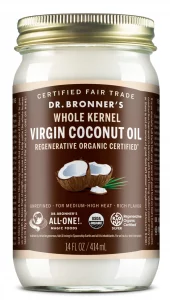
Best eco-friendly organic coconut oil
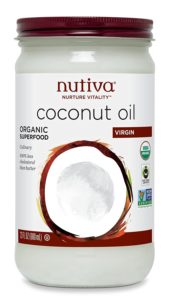
Best organic coconut oil runner up
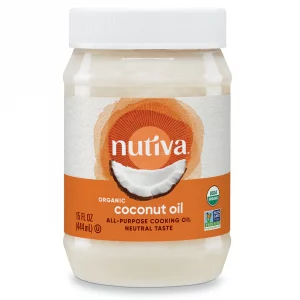
Best organic refined coconut oil
How to Choose Eco-Friendly Coconut Oil
Coconut oil used to be available only through small specialty producers. Nowadays, many grocery stores carry own brand coconut oil and other big businesses have also gotten in on the act. This has pushed smaller companies out of business. It also makes it much harder to figure out which coconut oil is genuinely eco-friendly.
To be truly sustainable, coconut oil needs to be not only organic (ideally regenerative organic) but made under fair working conditions in a zero-waste manner without animal cruelty, deforestation, or environmental pollution.
Companies big and small have long paid coconut farmers poorly, with many also avoiding paying taxes and exploiting and polluting overseas communities. Choosing fair trade and organic coconut oil helps ensure people and planet get a better deal.
Where does coconut oil come from?
Most coconut oil comes from the Philippines and Indonesia. According to a 2020 report, there are 340 million coconut trees on the 3.5 million hectares of arable land in the Philippines. These trees produce more than 14 billion nuts annually and the industry employs 25 million Filipinos.
Unfortunately, a huge number of these trees are old and likely need replacing soon. Many of these trees are also low-yield, poorly managed, and are under threat of logging for the coco lumber industry. In addition, coconut farms are often managed poorly and on a shoestring. This leaves the farms open to problems such as poor soil nutrition, pests and disease, natural disasters (increased by climate change), problems with land ownership, and poor infrastructure to bring coconuts to market.
Coconuts are impressive trees. They tend to grow in coastal regions where they’ve adapted to salty soils and high winds. Indeed, coconuts are typhoon resilient and bounce back quickly after typhoons. They’re also excellent trees on hillsides, where they provide cover as part of tropical rainforests. Coconut trees typically bear fruit for four to six years but can live up to 80 years. These trees also sequester a lot of carbon, making them a friend in the fight against climate change.
Sadly, while the coconut trees themselves are quite resilient, coconut farmers almost all live in poverty, making them the least resilient in the face of environmental and economic calamities. This is why it’s so important to choose coconut oil produced under fair working conditions. Doing so can help support increased community resilience and a more stable livelihood while also being better for the planet.
What’s the difference between virgin, extra virgin, refined, and unrefined coconut oil
In short, there is no such thing as ‘extra virgin’ coconut oil. While some companies like to use this terminology in branding, coconut oil is not like olive oil. The coconut only undergoes one pressing, so there’s no ‘first-press extra virgin’ designation. Indeed, some countries, like Canada, do not permit such designations on labeling.
There is, however, a difference between refined and unrefined coconut oil. Refined coconut oil is processed and treated to remove almost all of the proteins in the coconut meat or ‘copra.’ As such, it has a more neutral scent and taste and a higher smoke point. These oils are also partially hydrogenated due to the heat involved in refining, meaning they typically contain some trans fats.
In general, I wouldn’t recommend consuming refined coconut oil because of the chemicals involved and the potential for trans fats. However, Nutiva’s steam-extracted refined oil is a great choice as it isn’t processed using any hazardous chemicals and is also free of trans fats. Refined coconut is often a good choice for soapmaking or other non-culinary use, and may be tolerable for some people with coconut intolerances as it is typically the protein content of coconut that causes issues (avoid any coconut oil, refined or otherwise, if you have a true coconut allergy).
Unrefined coconut oil and whole kernel oil
Unrefined coconut oil – also known as virgin coconut oil – has all the richness, smell, and flavor of fresh coconut. That’s because it’s typically made within hours of coconut harvesting, instead of after several weeks of drying. The coconuts are quick-dried with a mechanical press or wet milled, which involves fermentation and a centrifuge to separate water and oil. This process doesn’t involve high heat or any additives, meaning no bleaching or deodorizing, just all the fresh flavor and aroma.
Some companies, such as Dr. Bronner’s use whole kernels to make coconut oil. This includes the brown inner skin of the coconut, which may carry some additional nutritional benefits but may also change the color of the oil ever so slightly. (Dr. Bronner’s also offers White Kernel oil made with coconut flesh without the skin.)
Coconuts, aflatoxins and hexane
Farmers typically crack coconuts after harvesting and leave these to dry in the sun for a couple of weeks to a month before extracting the oil. Without careful attention, the flesh of the coconuts can turn rancid and develop mold. This can discolor the oil, turning it brown. To make the oil edible again and eliminate aflatoxins, companies then bleach and deodorize the oil as part of the refining process.
Obviously, if you plan to consume coconut oil, you don’t want to expose yourself to aflatoxins and other contaminants. This doesn’t mean you have to just accept bleaching and deodorizing as a given. Instead, you can purchase coconut oil from a well-regarded company that has transparent sourcing, harvesting, and testing processes and certifications.
Companies like Lucy Bee and Dr. Bronner’s only use fresh coconuts processed within just a few hours of harvesting. This removes the risk of mold and aflatoxins developing during drying. These companies also undertake purity testing to ensure products are safe and contaminant-free.
Finally, some manufacturers use hexane (a solvent) during coconut oil extraction to increase the oil yield. To avoid any risk of solvent exposure, and to make life better for workers making coconut oil, choose cold-pressed or mechanically (expeller) pressed, solvent-free oil every time.
The best eco-friendly, sustainably-sourced coconut oil

Dr. Bronner’s Organic Fair Trade Virgin Coconut Oil
Highlights: Regenerative Organic and Fair Trade certified coconut oil made sustainably by a Benefit Corporation.
Dr. Bronner’s is consistently a top pick at Leaf Score as the B Corporation makes high-quality products in an ethical, sustainable manner. The company’s Regenerative Organic Virgin Coconut Oil is no exception as it is Fair Trade certified, organic, unrefined, non-GMO, and created from coconuts grown in a regenerative organic ecosystem.
The oil comes from fresh, dried coconut kernels and is extracted mechanically (expeller-pressed). It is ideal for baking, cooking, and personal care.
Dr. Bronner’s Regenerative Organic Coconut Oil comes courtesy of the B Corp’s sister company, Serendipol. This company works in Sri Lanka with farmers to “implement regenerative organic practices that enrich soil, promote biodiversity and sequester atmospheric carbon.” The oil now carries Regenerative Organic Certification (ROC). ROC focuses on animal welfare, farmer and worker fairness, and strict requirements for soil health and land management. It does far more than just USDA Organic to push the industry toward more sustainable farming practices.
Dr. Bronner’s offers two coconut oils, its White Kernel Coconut Oil with the brown inner skin removed for a milder taste, and its Whole Kernel Coconut Oil, which has a slightly nuttier taste. You can use both oils for cooking and body care. Neither oil has any synthetic preservatives, detergents or foaming agents.
At LeafScore, we use the products we rate 5 leaves, and Dr. Bronner’s is no exception. This is the coconut oil our team uses at home for skin, oil pulling, and occasionally, cooking. The oil has a subtle nutty flavor.
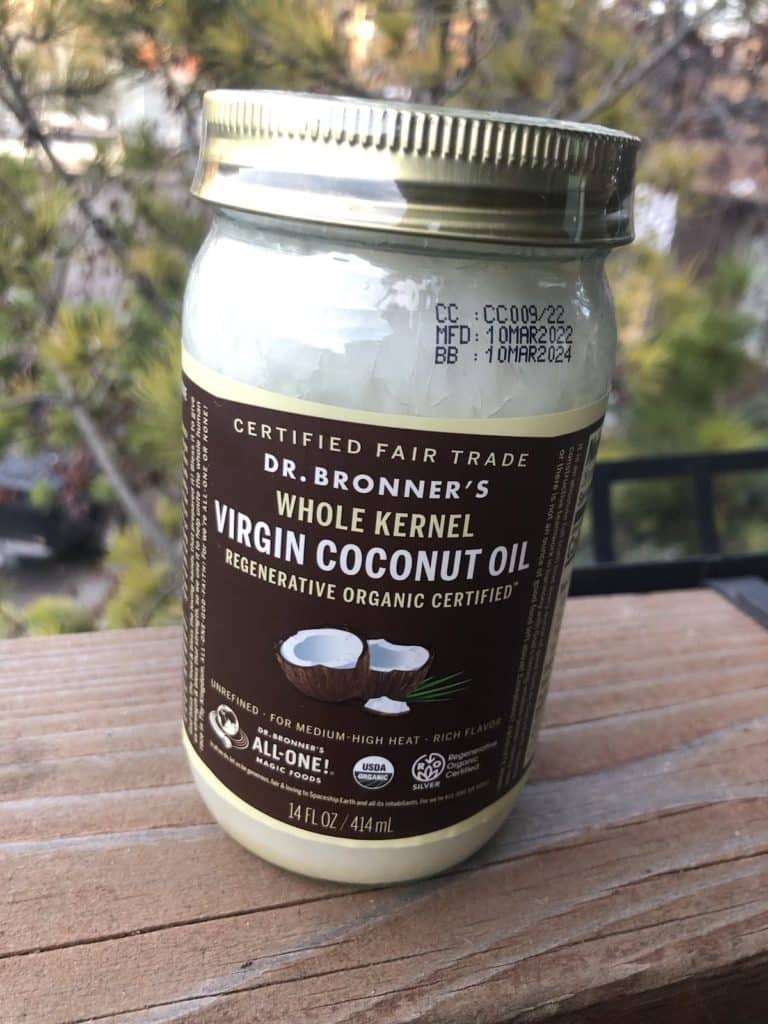
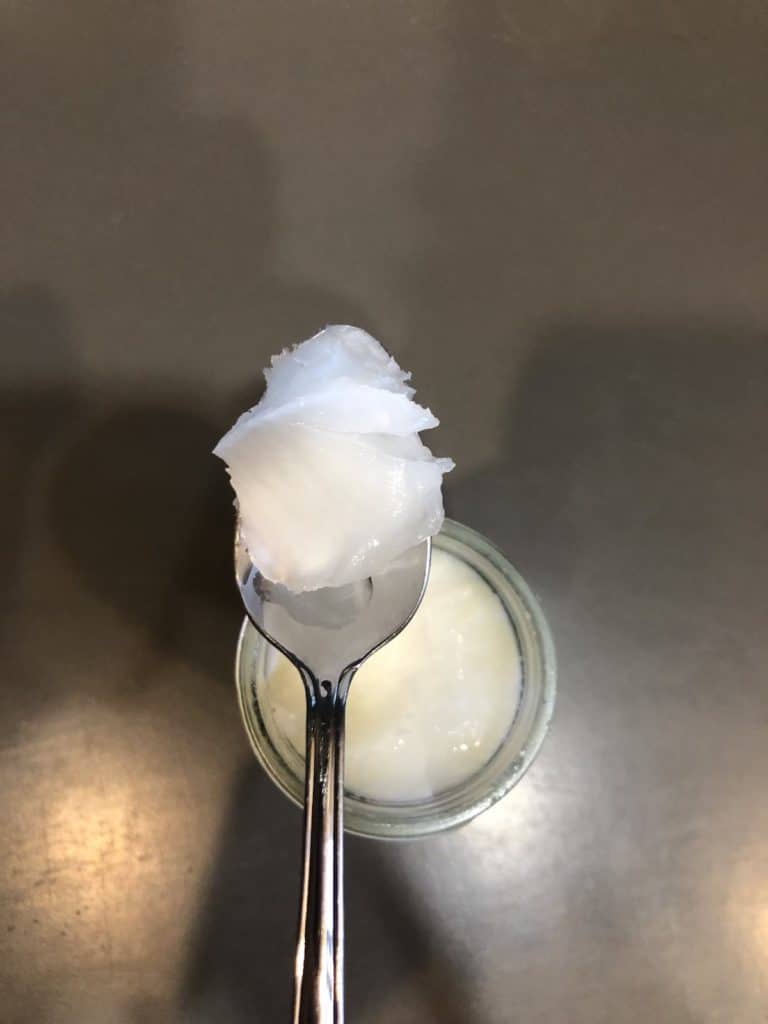

Nutiva Organic Virgin Coconut Oil
Highlights: Organic Fair Trade, virgin, unrefined coconut oil from a company that supports the community and the environment and uses zero-waste practices.
Nutiva Organic Virgin Coconut Oil is Fair Trade certified and made from fresh, USDA certified organic coconuts. The oil is cold-pressed right after harvesting and never refined, deodorized, or bleached. It comes in a glass jar you can reuse or recycle and is also available in pouches (harder to recycle) and in bulk plastic tubs up to a gallon in size. The company also offers refined organic coconut oil (see below) created using steam refining rather than chemicals.
Nutiva is now based in California and has been in the coconut oil business since 2002. The company sources ingredients sustainably and ethically to support local economies and the environment. Its products are non-GMO and include certified organic ingredients wherever possible. The company also partakes in a variety of planet-friendly and people-friendly initiatives and brought Fair Trade USA to the Philippines in 2015 to certify its virgin coconut oil.
Funds from the sale of every jar of the oil now go into a community-led fund that supports and empowers farmers and their communities. In 2015, Nutiva sponsored the planting of 100,000 coconut seedlings for small organic farmers in the Philippines. By 2020, these seedlings grew into fruit-bearing coconut trees to provide farmers with additional income.
Nutiva also partnered with Grameen Foundation to launch The FarmerLink Program in the Philippines. This program helps organic coconut farmers “increase crop productivity, deal with crop pests and diseases and increase the sustainability of their farms.” In 2020, three major typhoons hit the Philippines. Nutiva stepped up to help rebuild homes, offer sponsorship for clean-up work, and donated directly to local organizations supporting those in need.
As the world’s leading organic brand of hemp, coconut, chia, and red palm superfoods, Nutiva takes its social impact seriously. It publishes environmental and social reports annually (since 2016) and is transparent about company operations.
Nutiva has a zero-waste program at its headquarters and warehouse, with 95% of waste materials diverted from landfill in 2015 and either reused (33%) or recycled (62%). Nutiva earned Gold Standard certification from the U.S. Zero Waste Business Council.
In 2013, Nutvia started working with Natural Habitats & Palm Done Right to create a more sustainable, equitable supply chain for red palm oil, including gaining Fair for Life, Deforestation-Free, Wildlife Friendly and 100% Organic certification. The company is also working with the Detox Project to get its entire product range certified Glyphosate Residue Free.
Nutiva offset some of its carbon emissions in 2015 and introduced CO2 Conscious packaging that cut emissions by 84%. The company aims to switch entirely to carbon neutral packaging and became a California Green Business in October 2013. Since its start in 1999, Nutiva has donated 1% of sales revenue to regenerative agriculture programs.

Nutiva Organic Refined Coconut Oil
Highlights: The only refined coconut oil I recommend. Steam-extracted, trans-fat-free, and made by a B Corp that supports regenerative agriculture.
I wouldn’t typically recommend eating refined coconut oil because it is usually processed with chemicals and can contain trans fats due to high heat. Nutiva’s steam-extracted refined oil is a great choice though as it is organic, Fair Trade, and processed without any hazardous chemicals. It is also free of trans fats and comes in a large size glass bottle.
As above, Nutiva is a B Corporation that donates to regenerative agriculture programs and has a robust approach to sustainability.
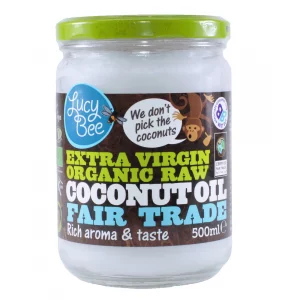
Lucy Bee
Highlights: Certified Fair Trade, organic, single-source coconut oil packaged in an eco-friendly way by an ethical, sustainable company.
Lucy Bee Coconut Oil is ‘extra virgin’, unrefined, organic and raw. It comes from the Philippines and is Fair Trade and cold-pressed. You can use it for cooking, baking, skincare, and more. Lucy Bee works with farmers who grow coconuts in an agroforestry environment among banana trees, other crops, and livestock. This is better for biodiversity and the environment overall compared to plantation coconuts.
The oil comes from a single estate, rather than being blended. The farmers use all parts of the coconut to produce a variety of products, throwing nothing away. The company processes the coconut meal in the Philippines and ships the oil to the UK for bottling in an audited facility. It undergoes testing upon import for purity, shelf-life, and bacteria and funguses. Lucy Bee also tests to confirm that the oil is lactose- and gluten-free.
This oil has Soil Association Cosmos Organic certification which guarantees it comes from sustainable sources and is organic. SA certification is also an indicator that a product is biodegradable, minimally packaged, and involves no animal testing, GMOs, controversial chemicals, parabens or phthalates, synthetic colors, dyes or fragrances and no nanoparticles.
Lucy Bee only sells Fair Trade products and has worked in the Philippines to build community wells, install solar arrays and solar bulbs in residences, and provide scholarships. The company pays a premium for its organic coconuts that goes to the local farmers and local communities for social projects. It also gives 0.75% of sales to the Fair Trade governing body and donates to charities.
This coconut oil comes in 300 and 500 mL glass jars with BPA-free aluminum lids that you can easily recycle. The jars comprise 20% recycled glass and have an easy-peel label. Lucy Bee made this choice to encourage buyers to clean and reuse the jars as part of a zero-waste lifestyle. The 5 L tub of oil comes in a food-grade plastic pail that is BPA-free with a non-intent BPA-free liner. It is also recyclable.
The company also ships products in recyclable boxes using recycled and recyclable and biodegradable zigzag shredded paper made from 100% recycled material. They even use tape made with recyclable paper. Lucy Bee donates the equivalent carbon offsets from its operations to a charity.
Lucy Bee stresses that no monkeys are used to harvest their coconut, but this isn’t common practice in the Philippines anyway. Also, ‘extra virgin’ isn’t a real thing for coconut oil as there’s only ever one pressing of the coconut for oil, unlike with olive oil.
This oil got a best buy rating from Ethical Consumer, scoring a full 18/18 on its rankings.
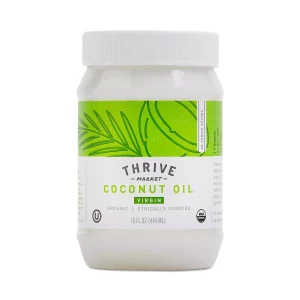
Thrive Market Organic Coconut Oil
Highlights: Affordable unrefined organic coconut oil that’s also Fair Trade.
Thrive Market offers its own-brand coconut oil that’s Fair Trade and organic certified, non-GMO, and unrefined. The big downside is that it’s in a plastic container. The upside is its relative affordability.
The coconut oil comes from ethically sourced, sustainably harvested coconuts from the Philippines and Sri Lanka. It’s free from pesticides and preservatives, and the coconuts are also grown using (uncertified) regenerative farming practices that improve soil and reduce the amount of carbon dioxide in the atmosphere.
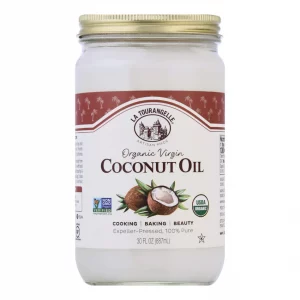
La Tourangelle Organic Coconut Oil
Highlights: Large (14 and 30 oz.) glass jars of organic unrefined coconut oil by a family-owned company that treats workers well.
La Tourangelle is a small French artisan oil maker. The family-owned company makes non-GMO and organic certified coconut oil in the Philippines. It makes efforts to support the natural environment, provide fair compensation to coconut farmers, and contribute to the local community. The coconut oil is available in a 14 oz. and 30 oz. glass jar.
La Tourangelle makes the virgin coconut oil using organic coconuts that undergo expeller-pressing within four days of harvesting. La Tourangelle offers a subscription service and one-time purchases.
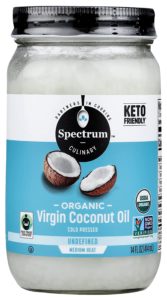
Spectrum Organics Fair Trade Unrefined Virgin Coconut Oil
Highlights: Organic, Fair Trade coconut oil in a glass jar from a well-regarded, long-established Californian company.
Spectrum Organics Fair Trade Unrefined Virgin Coconut Oil is available in a glass jar and a larger BPA-free plastic pail. The oil comes from the Philippines and is cold-pressed, Fair Trade, unrefined, and certified organic. Spectrum also offers coconut oil that is not Fair Trade and that is refined, as well as non-culinary organic, unrefined coconut oil in a larger plastic tub.
My recommendation is for the glass jar of the Fair Trade, Organic, Unrefined Coconut Oil that specifies it is cold-pressed. Some of the jars don’t carry the Fair Trade mark.
The California company began in 1986 and was acquired in 2005 by Hain Celestial. This umbrella company also owns Avalon Organics, Celestial Tea, and other brands. Hain Celestial has a generally good reputation for ethics and Spectrum Organics itself is committed to using organic, non-GMO ingredients and chemical-free extraction methods for its oils.
As an industry giant, Spectrum Organics has arguably helped improve the culinary oil sector as a whole. This includes pushing for better extraction processes and organic certification, as well as third-party testing and verification of the absence of GMO. The company now offers more than thirty varieties of culinary oils, many of which are organic.